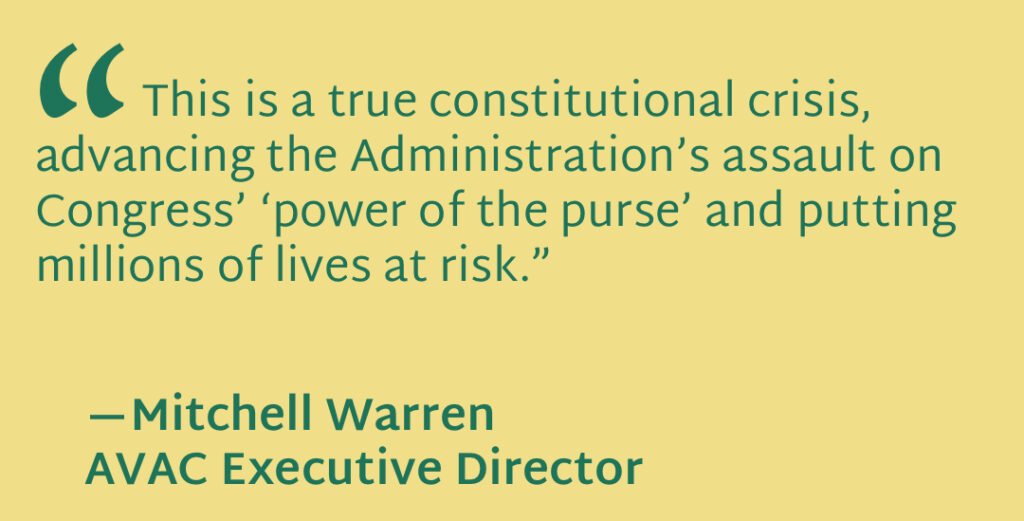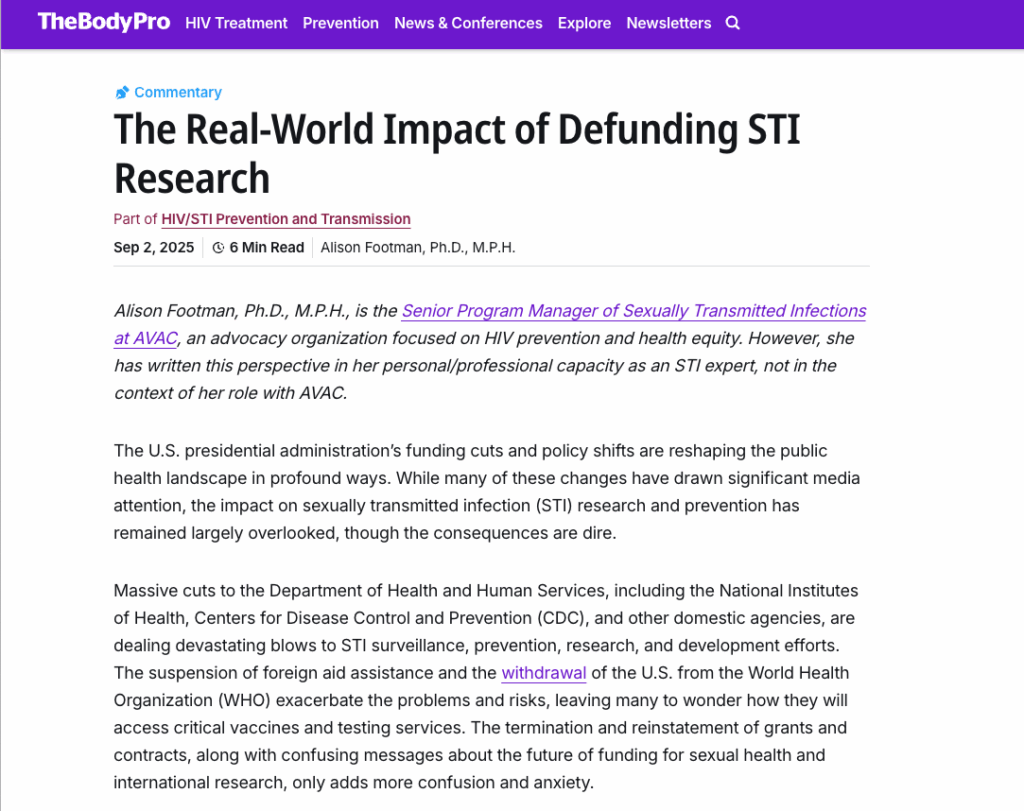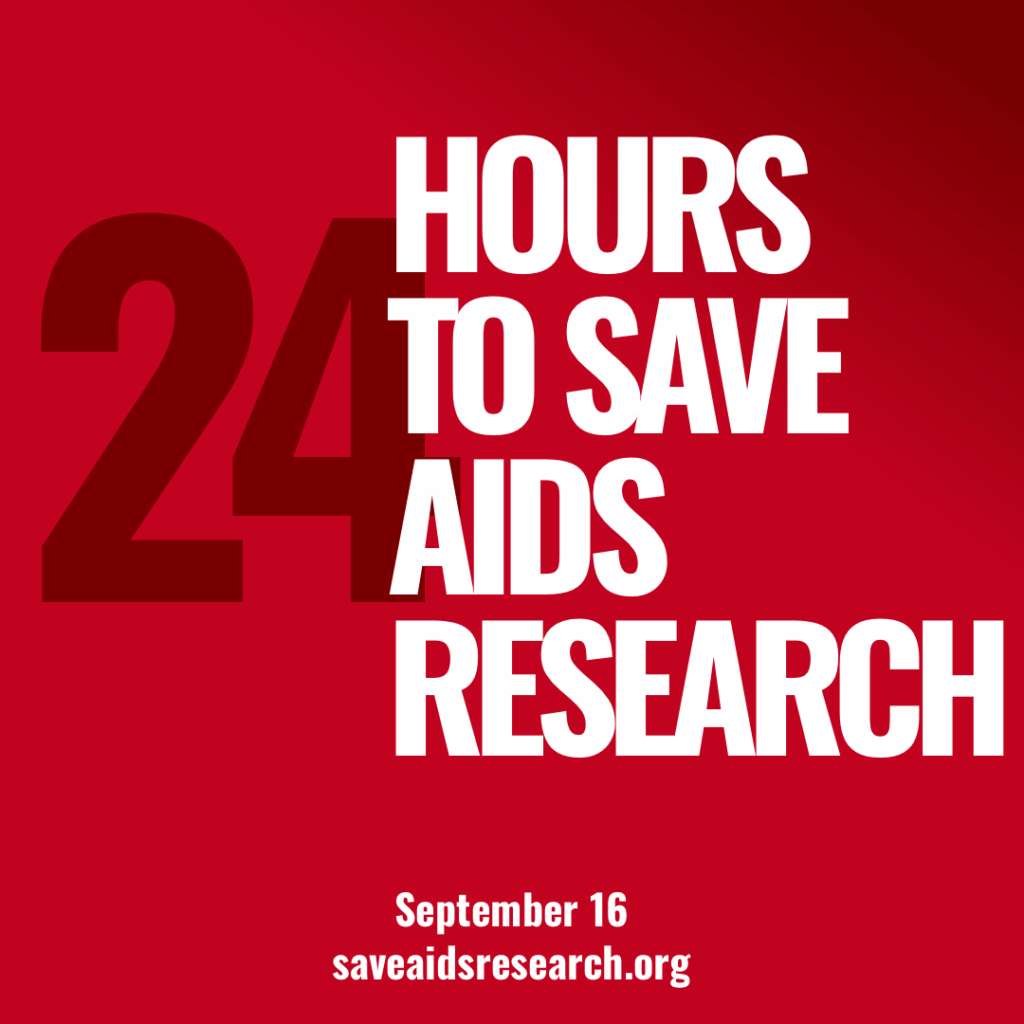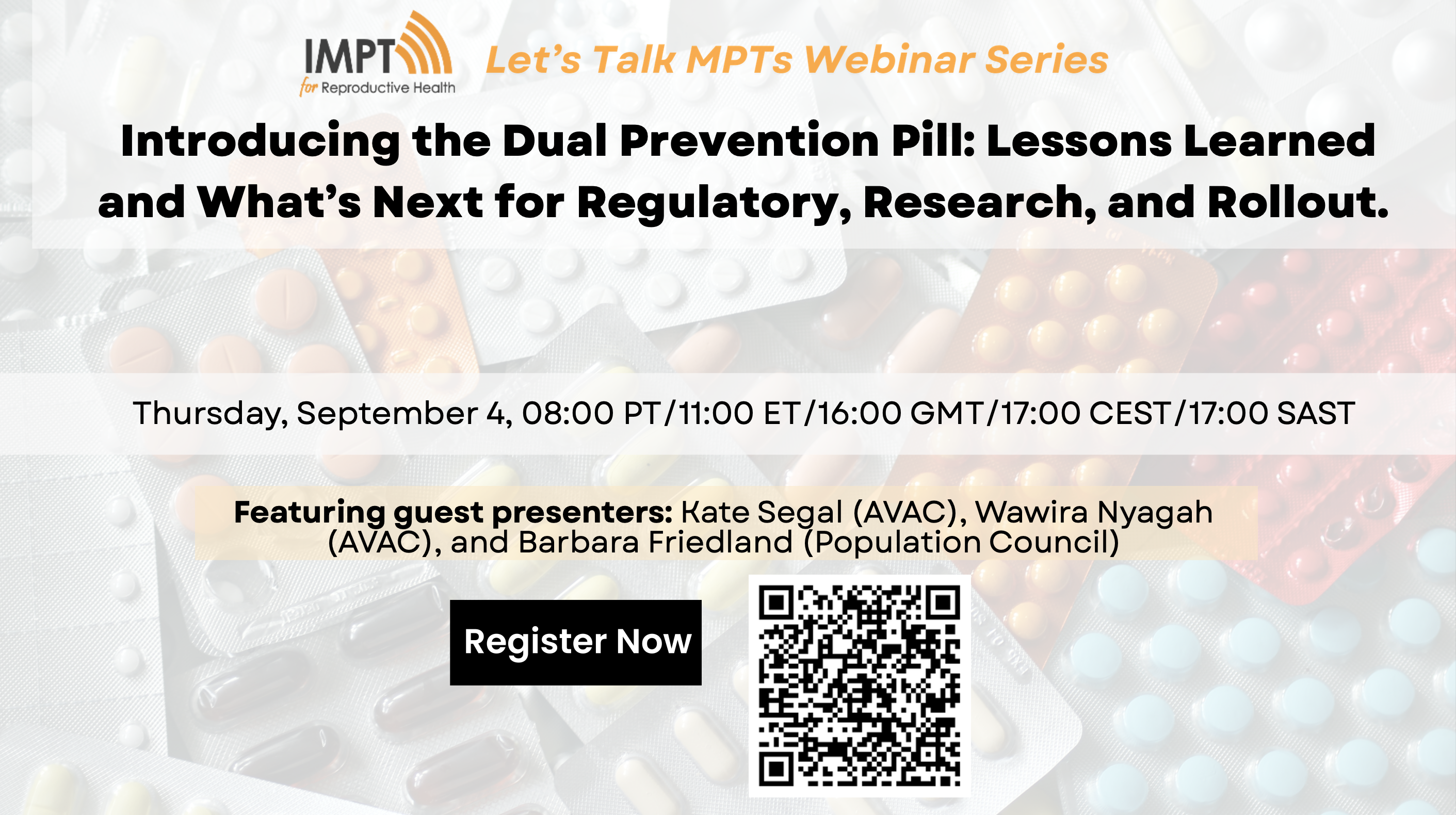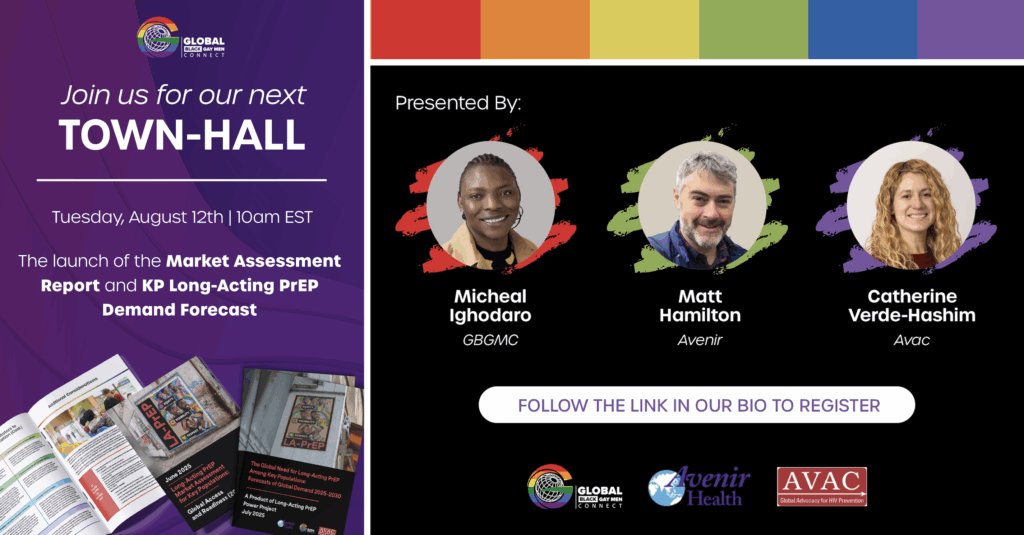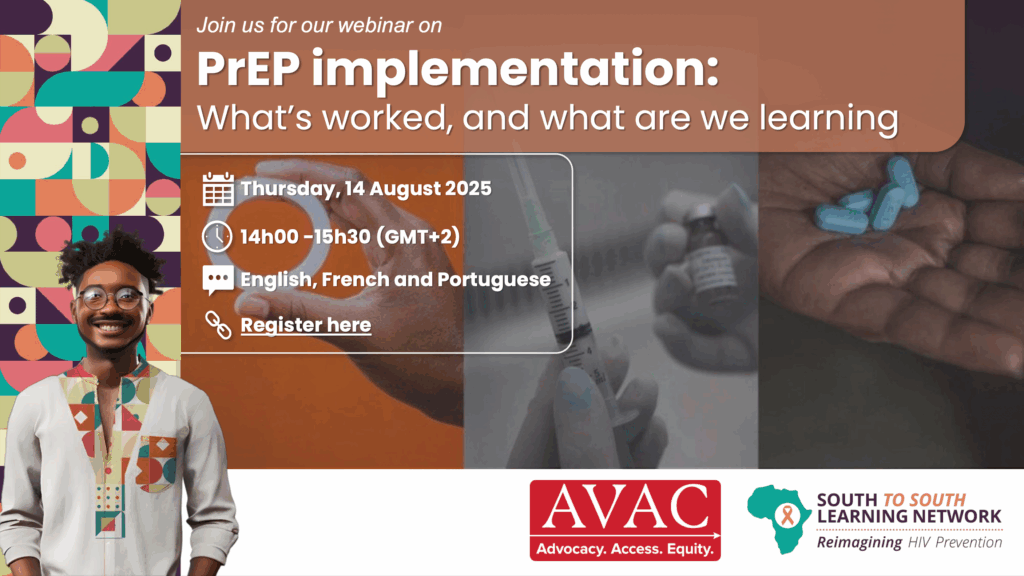Members of the US Congress reconvened this week following their extended August recess. They now face a looming deadline of the end of the fiscal year on September 30 to avert a government shutdown if they cannot agree to a bipartisan fiscal year 2026 (FY26) federal budget by then. In this context, the FY26 appropriations process, the President’s request for “pocket rescissions” to claw back Congressionally appropriated funds, AVAC’s court case (AVAC v. State Department), and PEPFAR’s reemergence to rollout long-acting PrEP take on heightened urgency.
PEPFAR Reemerges to Support Rollout of LEN for PrEP
The President’s Emergency Plan for AIDS Relief (PEPFAR) and Gilead Sciences yesterday announced plans to procure injectable lenacapavir for PrEP (LEN) in “countries with the largest HIV/AIDS epidemics…with a focus on preventing mother-to-child transmission.” This is not new news, since PEPFAR and the Global Fund had already announced an ambition to reach two million people with LEN in the first three years – and the Global Fund recommitted to the ambition in their July announcement with Gilead. But given the past seven months and PEPFAR’s absence from planning, it is good to see PEPFAR committing to prevention and PrEP again.
IMPLICATIONS: Yesterday’s announcement at least gets PEPFAR back, but there are still many questions to be answered and critical work to be done to ensure this initiative achieves impact for all populations in need of prevention: which countries and which populations; what volumes and what prices; and how to invest in this important innovation when PEPFAR budgets are being slashed by the Office of Management and Budget (OMB)? But “it’s a step forward from where we’ve been in a fairly paralytic state for the last seven months, and I hope that this breaks the logjam and at least can get prevention back on the agenda,” AVAC’s Mitchell Warren told NPR.
READ:
- Why the medical community is thrilled by U.S. support for a ‘breakthrough’ HIV drug—NPR Goats & Soda
- PEPFAR’s Support of American Innovation to Reach up to 2 Million People by 2028 with Breakthrough HIV Drug Lenacapavir—US Department of State
- Gilead Announces Partnership With PEPFAR to Deliver Twice-Yearly Lenacapavir for HIV Prevention for up to Two Million People in Primarily Low- and Lower-Middle-Income Countries—Gilead Sciences
- PEPFAR aims to complete “Bridge Planning” sprint and a “Self-Reliance Strategy” by September 30—To End a Plague Again Substack
NIH Budget Preserved Under Appropriations Bill, But for How Long?
The House Labor, Health and Human Services, Education, and Related Agencies Appropriations Subcommittee (LHHS), which oversees NIH funding, issued its draft FY26 spending bill and summary. It notably preserves NIH funding at approximately $48 billion. Significantly, this bill reflects the Senate version, which rejects the President’s proposed 40% cut and retains all 27 NIH institutes and centers. Next week, the committee will issue a report detailing how the money should be spent, setting the stage for a broader spending debate across Congress. Meanwhile, the action to terminate nearly 800 NIH grants was ruled “illegal and potentially racially discriminatory” by a federal judge, triggering talks of a settlement to restore funding that could conclude later this week.
IMPLICATIONS: While NIH funding levels in Congressional bills reflect continued bipartisan support for biomedical and implementation research, proposed deep cuts to the Centers for Disease Control and Prevention (CDC) and broader Health and Human Services (HHS) have the potential to further dismantle public health infrastructure in the US. And what happens after next week’s appropriations Committee report will shape not only the stability of NIH and CDC, but the future of US global health commitments. As FY26 appropriations move forward, the House and Senate bills will need to be reconciled with agreement on final spending levels between the two chambers. Perhaps more importantly, though, is whether the President and the OMB will spend Congressionally appropriated funds next year, given their current attempts to usurp Congress’s power of the purse.
READ:
- House bill cuts HHS budget but excludes RFK Jr.’s reorganization, maintains NIH funding—STAT
- House GOP keeps NIH funding Trump wanted to cut—Axios
- House Republicans add to support for maintaining NIH budget in 2026—Science
- A closely watched legal battle over NIH funding cuts could settle soon—STAT
The Latest in Foreign Aid
Earlier this week, the US President issued a “pocket rescission” request, a questionable budget maneuver, which would effectively run down the clock without disbursing nearly $4.9 billion in Congressionally appropriated FY25 foreign assistance funding. This week, advocates rallied in Washington, D.C., to demand the release of global AIDS funding warning that a “pocket rescission” defies the law, sabotages programs like PEPFAR, and jeopardizes lives. See AVAC’s statement condemning the President’s pocket rescissions request.
Then on Wednesday night, the US District Court issued a new preliminary injunction in AVAC v Department of State and Global Health Council v Trump, blocking the US government from withholding funds that Congress has already appropriated. Of importance, this is the first case to explicitly reject the legality of a “pocket rescission.” The government immediately filed yet another appeal of this ruling to the US Circuit Court of Appeals.
IMPLICATIONS: These developments underscore both the urgency and the stakes. On one hand, the District Court’s injunction in AVAC and GHC affirms that the “pocket rescission” is unlawful, protecting billions in global health funding from executive overreach. On the other, the Administration’s ongoing maneuvers in the courts reveal its intent to undermine Congress’s constitutional “power of the purse” and strip away resources from foreign assistance programs. AVAC and partners will continue to press in court, in Congress, and with communities to ensure that funds flow as appropriated, because at stake is not only the survival of HIV prevention and treatment programs worldwide but also the fundamental balance of powers in US governance.
READ:
- New Preliminary Injunction Issued in Foreign Assistance Lawsuit Is a Victory for Rule of Law—Public Citizen
- Donald Trump Suffers Major Legal Blow Over Billions in Foreign Aid Cuts—Newsweek
- Protesters demand release of HIV funds ‘illegally’ withheld by Trump—The Guardian
- The Pocket Rescission Gambit: Trump’s Strategy to Cut Foreign Aid Without Congressional Approval—Center for Global Development
- AVAC Condemns US Administration’s ‘Pocket Rescission’ Request to Withhold Billions in Foreign Aid—AVAC
- Republicans dismayed by Trump’s decision to use pocket rescission—The Hill
- Appeals Court Declines to Block Trump From Freezing Foreign Aid—New York Times
Vaccines Unraveling
New developments that have been building to further undermine vaccine policy and scientific expertise in the US are coming to a head. This week, Paul Offit, a pediatrician and co-inventor of the rotavirus vaccine, was removed from the FDA’s Vaccines and Related Biological Products Advisory Committee; Florida rolled back its mandate requiring pediatric vaccines for entry into the public school system; the President publicly challenged pharmaceutical companies to prove that their COVID‑19 vaccines still work; and HHS Secretary Robert F. Kennedy Jr. continued to muddy the waters regarding vaccine safety and efficacy. Meanwhile, two leading NIH scientists filed whistleblower complaints, stating they were stripped of leadership roles after objecting to the Trump administration’s efforts to undermine vaccines.
IMPLICATIONS: These developments signal a dangerous escalation in the US government’s ongoing assault on vaccine science and policy. The politicization of vaccines in the US threatens to reverberate internationally, fueling disinformation and destabilizing decades of progress in immunization and epidemic preparedness.
READ:
- Whistle-Blower Complaints Detail Tension Over Vaccines at N.I.H.—New York Times
- Kennedy faces off with senators, defends firing CDC director at hearing—STAT
- Trump says CDC is ‘being ripped apart’ over Covid products, calls for drugmakers to prove their benefits—STAT
- Trump Wants Proof That Covid Vaccines Work. It’s Easy to Find.—New York Times
- FDA Pulls RFK Jr. Critic Off Its Vaccine Advisory Panel—MedPage Today
- Unraveling the arc of vaccine progress—Science
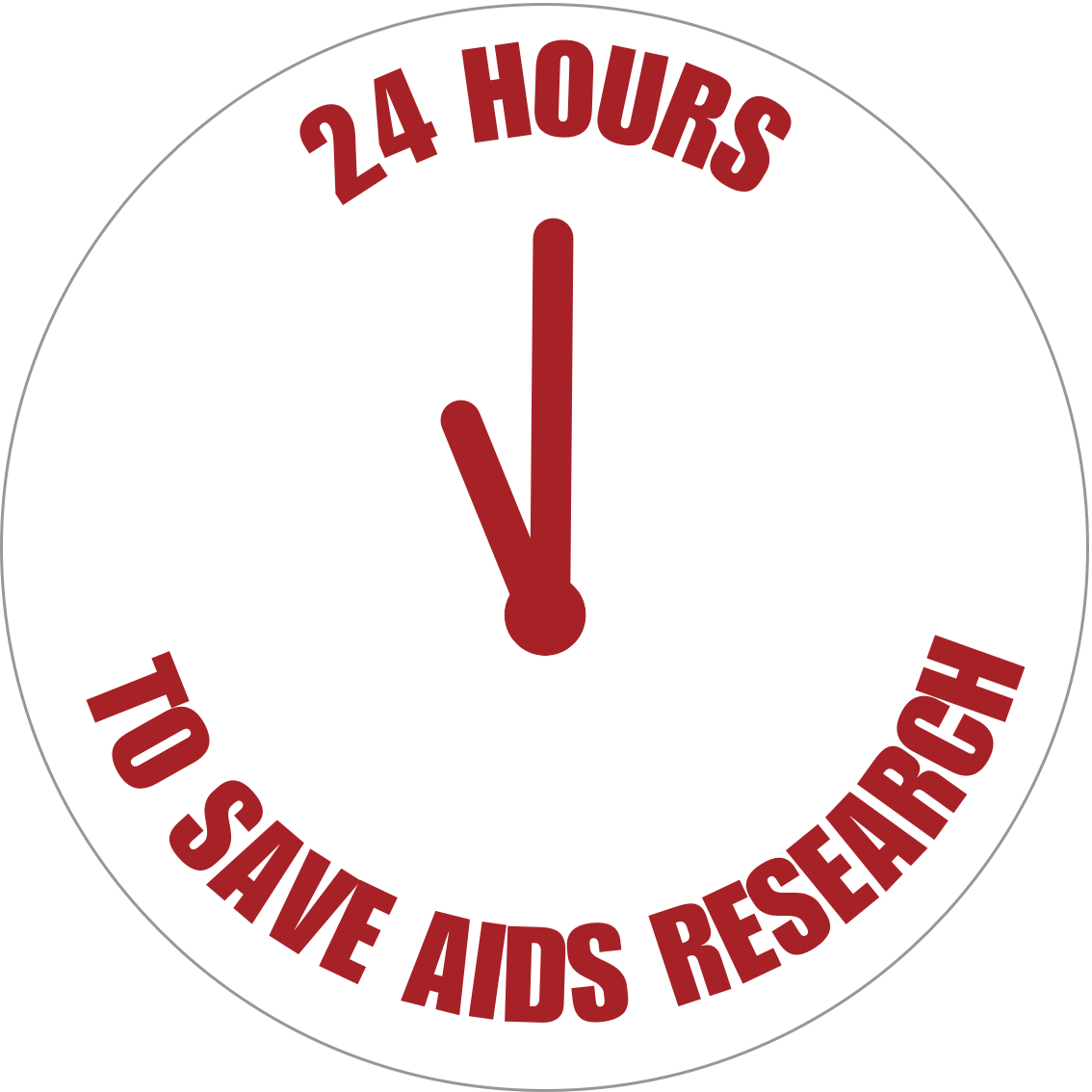
Join us September 16-17
AVAC and partners are hosting a 24-hour livestream event with scientists, researchers and advocates from around the world to share insights, answer questions, and inspire action!
What We’re Reading
- Changes at NIH Give Political Appointees Greater Power To Fund or Block Research—KFF
- Watching the Chaos at the CDC — with Sadness and Alarm—Jwatch
- Modeling the fallout: projecting the global impact of donor funding cuts on HIV prevention, treatment, and care—Current Opinion in HIV and AIDS
- Trump’s aid cuts in east Africa led to unwanted abortion and babies being born with HIV – report—The Guardian
- Joint statement calling for Secretary Kennedy resignation—Infectious Diseases Society of America
- WATCH: RFK Jr. testifies on Trump’s health care agenda before the Senate Finance Committee—PBS NewsHour
- Philanthropic initiative launches long-term fund to replace USAID stopgap—Devex
- The Real-World Impact of Defunding STI Research—TheBodyPro
Resources
- A Resource Round Up Covering Funding Fights & A New Generation of PrEP, AVAC
- US Investments in the Global Fund Strengthen the US Economy, One Campaign
- HIV Research on Pause: Impacts of US government cuts on HIV R&D, AVAC
- Getting PrEP Rollout Right This Time: Considerations for LEN for PrEP Introduction, AVAC
